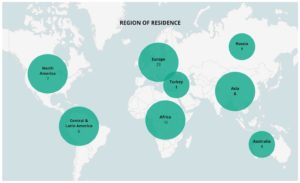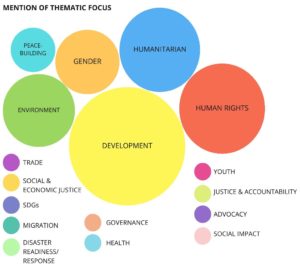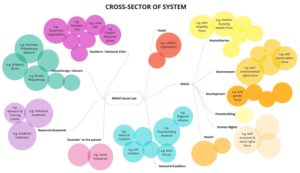Who is in the RINGO Social Lab? And how were they selected?
The RINGO “Social Lab” is at the heart of our project, and it was designed to create the conditions needed to reimagine and co-create pathways for genuine change. The members of this group have committed to collaborate on redesigning and transforming the INGO system.
In April 2021, the Lab gathered together ‘the system’ of INGOs in a microcosm of 55 people. When curating this group, our aim was to gather a broad range of participants from different geographies, types of organizations, and representing different races, genders and so on. Lab members have been asked to contribute as individuals, and do not represent their organization (for those from or affiliated with organizations). Since we started to launch the RINGO prototypes in March 2022, we have welcomed many new Lab members who joined as part of the prototyping teams. The RINGO Social Lab currently has 95 contributors.
It is by no means a perfect collective in terms of diversity, but we believe it sits somewhere between a reflection of the system as it is currently, and the system we hope to see in the future.
For our original cohort, we sought participants who could bring in different perspectives, who are strategic thinkers, and who will be able to influence change.
When reviewing applications to the Lab, people were asked about:
- leadership experience,
- experience of working in or in collaboration with INGOs,
- and some experience of working from an international and local perspective.
We looked for those individuals who have influence with a wider group of stakeholders that they interact with (e.g. INGOs, social movements, funders etc.), and who can advocate for change or are in a position to influence change. We wanted people in the Lab who would be prepared to engage in outreach with stakeholders throughout the process, and who would take the initiative to do so.
We looked for strategic thinkers, who are:
- impatient for change and uneasy with the status quo,
- and who have a keen interest in being part of a positive change and contributing to and implementing solutions to the problem.
Having screened applicants against these criteria, we then deliberately sought to balance out the following factors:
- Geographic distribution – we aimed to have balanced participation from non-western INGO host countries
- Organisational distribution – we sought a diverse cross-section of organisational, thematic and sectoral experience ‘in the room’, e.g. development, humanitarian, environment, peace-building etc.
- Outsiders – we searched for a small number of participants from ‘outside’ of civil society who are still part of the ‘system’, i.e. those from social enterprise, academics, donors etc.
- Finally, when curating and balancing the group, we considered the representation of youth, gender, race and ethnicity, to ensure that the Lab would include diverse voices.
The charts below give a snapshot of the original Lab in terms of its diversity and representation. (We are still gathering data from the newer Lab members)

*This is a reflection of where members are based, rather than their nationality; a number of those based in the Global North are members of different diaspora from other regions


